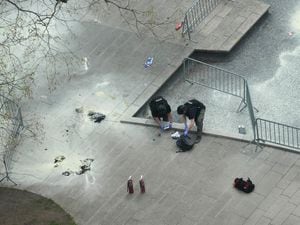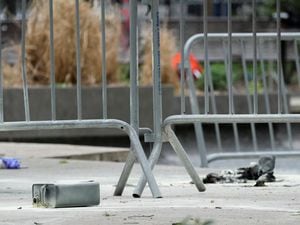Hundreds of women join rally in protest against Belarus police crackdown
Groups of women formed human chains in Minsk, urging authorities to stop their violent suppression of demonstrations.

Hundreds of women have rallied across the Belarus capital in protest against a brutal police crackdown that left hundreds injured and thousands detained while challenging election results extending the rule of the country’s authoritarian leader.
In several parts of Minsk, groups of women formed human chains, chanting “Shame!” and urging authorities to stop their violent suppression of demonstrations. Police moved to disperse them, but stopped short of violent tactics they have used previously.
Protesters are contesting the official count showing President Alexander Lukashenko winning a sixth term with 80% of Sunday’s vote and the main opposition challenger with 10%. Crowds have taken to the streets every night since to demand a recount.

Authorities responded with a crackdown that was unusually brutal even for Mr Lukashenko’s 26-year authoritarian rule. Police dispersed protesters with tear gas, stun grenades, water cannons and rubber bullets and beat them with truncheons.
Black-uniformed officers chased protesters into residential buildings and deliberately targeted journalists, beating many and breaking their cameras.
“We stand for a peaceful protest,” said Ksenia Ilyashevich, a 23-year-old IT specialist who joined other women in Minsk. “We worked up the courage and came out to rally. Hundreds and thousands of Belarusians express solidarity with us, but are afraid (to come out). We stand here for all.”
In three nights of protests, at least 6,000 people have been detained and hundreds injured, according to the official count that appeared to downplay the crackdown’s scope. Anguished relatives were besieging prisons across Belarus trying to find their missing relatives.

Mr Lukashenko, 65, has led the country of 9.5 million people with an iron fist since 1994, relentlessly stifling dissent and winning the nickname of “Europe’s last dictator”.
This year the economic damage caused by coronavirus and the president’s response to the pandemic, which he airily dismissed as “psychosis”, has fuelled broad anger, helping swell the opposition ranks.
Mr Lukashenko has derided the political opposition as “sheep” manipulated by foreign masters, and vowed to continue clamping down on demonstrations.
“The core of these so-called protesters are people with a criminal past and (those who are) currently unemployed,” he said during a meeting with security officials.
His top challenger, 37-year-old former teacher and political novice Sviatlana Tsikhanouskaya, united fractured opposition groups and drew tens of thousands to her campaign rallies after two top potential challengers were barred from the race.

But she left for neighbouring Lithuania on Tuesday in an abrupt about-face, hours after publicly disputing the vote results and submitting a formal request for a recount. She urged her supporters to end rallies in a video statement her associates said was recorded under pressure from law enforcement officials.
One demonstrator died on Monday in Minsk, when an explosive device he attempted to throw at police exploded in his hands, according to the Interior Ministry.
On Tuesday, a protester in the city of Brest, on the border with Poland, was wounded when officers fired on protesters who attacked them with metal rods.
In Minsk, reporters from several Belarusian and international outlets were beaten up. Officers seized memory cards from a group of photographers as they took shots of the police crackdown.
Belarusian human rights group Viasna said many injured protesters were afraid to seek medical help, fearing prosecution for participating in the rallies.





